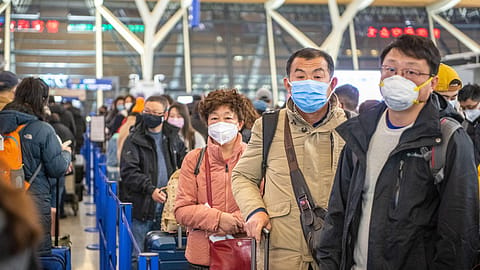Coronavirus concerns loom over the auto industry
The lag in procurement of automotive components from China, though manageable in the short term, could hit production at slowdown-hit automakers in India.

Suspension of work amid the coronavirus outbreak in China has impacted the global auto industry as a large number of automakers depend on China for supplies and spare parts. Uncertainty is looming over the Indian auto industry, too, which is already in the grip of a slowdown for over a year.
Fitch Solutions on Wednesday said it expects vehicle production in India to plunge 8.3% in 2020 due to the disruption in the supply of auto parts from China. “China supplies India with 10%-30% of its automotive components and this could be two to three times higher when looking at India’s electric vehicle (EV) segment, which highlights just how exposed India’s automotive manufacturing industry is to the slowdown of vehicle Chinese component manufacturing,” it said.
The agency said weak domestic demand for new vehicles will see India’s vehicle production continue to contract in 2020.
Some provinces in China are likely to extend the Lunar New Year holiday till February 17, making it longer for industries to resume work. The virus has already claimed over 900 lives and with more than 40,000 confirmed cases in China, according to the country’s National Health Commission.
Since China is one of the largest suppliers of automotive components to India, this production halt could affect domestic production to a large extent, especially for EVs.
“Majority of the EV and internal combustion (IC) vehicle manufacturers across the globe have some fraction of the components imported from China. Coronavirus is a threat, beginning to become serious to the EV industry in India due to the lag in the procurement of components and batteries from China,” said Sohinder Gill, director general, Society of Manufacturers of Electric Vehicles (SMEV).
Gill said that while components can be taken care of—to some extent—in the short run, as manufacturers usually keep two-three months stocks but batteries and battery cells are imported in small batches. “Since they come with a limited warranty, manufacturers do not maintain large inventories. Coronavirus is yet to be contained and has affected the manufacturing hubs in China. If the spread is not checked, it is likely to disrupt the EV ecosystem in India on a large scale.,” he explained.
Recommended Stories
Auto analysts say till now there were challenges on the demand-side but this [coronavirus outbreak] will have an impact on the supply front as well. “There can be two major impacts on the auto industry. One is direct to carmakers those who have CKD (completely knocked down) sourcing from China, while the other is indirect, which comes from the supplier component side. This can bring a major impact [on the supply of] electronic components or EV components like printed circuit boards, semiconductors, etc.,” Gaurav Vangaal, senior analyst, automotive forecasting (light vehicles).
“We expect in the first phase major carmakers will able to manage the production by changing the model/variant mix, which may remain unnoticed. Nevertheless, if China plant shutdown extends, we may have more prominent production losses in India,” he said.
India has reported three coronavirus-affected cases from Kerala. Researchers from Humboldt University and Robert Koch Institute in Germany have said that India ranks 17th among the countries at risk of importing coronavirus cases. “Among the airports in India, the Indira Gandhi International Airport in New Delhi is most at risk, followed by airports in Mumbai, Kolkata, Bengaluru, Chennai, Hyderabad, and Kochi,” the research said.
Sridhar V, partner and practice leader, Grant Thornton India, sees this as an opportunity for the domestic auto components sector to grow and become more independent. “The auto sector in India is already facing the brunt of coronavirus since it is fairly dependant on components from China. Even if the dependency is not significant, it still impacts in terms of the final produce. While this is seen as a short-term impact, we should also recognise the time and cost impact on identifying an alternate arrangement,” he said.
(INR CR)